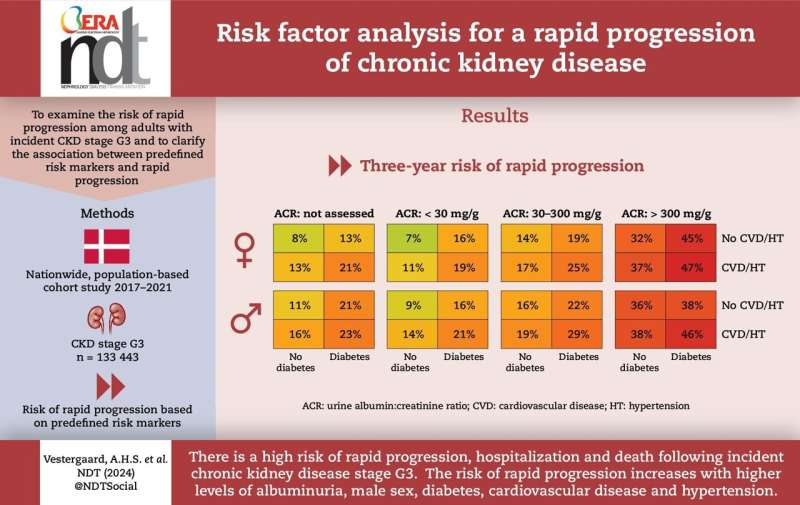This article has been reviewed according to Science X's editorial process and policies. Editors have highlighted the following attributes while ensuring the content's credibility:
fact-checked
trusted source
proofread
Simple measurement can predict risk of worsening of widespread kidney disease

About ten percent of the Danish population suffers from chronic kidney disease, and some individuals experience rapid deterioration after the diagnosis is made.
Now, a team of researchers from Aarhus University in a comprehensive study has investigated the precise risk of rapid progression, and the result could be a significant step towards more effective treatment of the disease.
The study, which is based on data from Danish health registers, provides health care professionals with new insights into how to identify better patients at high risk of rapid worsening of kidney disease.
"We chose to investigate chronic kidney disease because some of the patients experience rapid deterioration of their condition without us knowing exactly who. Our goal was to understand which patients are most at risk and whether we can intervene early to delay or even prevent this progression," says Professor at the Department of Clinical Medicine at Aarhus University, Christian Fynbo Christiansen, one of the authors of the study.
A simple measurement
The study showed that patients with newly diagnosed mild to moderate chronic kidney disease within three years have a 15 percent risk of rapid progression, which could lead to severe cardiovascular disease or even death.
Surprisingly, the study also showed that the risk of rapid progression varied significantly among patients.
A simple measurement of protein in the urine proved to be a strong indicator of the course of kidney disease.
For women without diabetes or elevated blood pressure/cardiovascular disease and without the protein albumin in their urine, the risk of rapid progression was seven percent, while the risk peaked at 47 percent for men with both diabetes, elevated blood pressure/cardiovascular disease, and albumin in their urine.
"This is an important finding since albumin can be used as an indicator of kidney disease progression, thereby making it possible to identify patients at high risk of rapid deterioration of the disease, and it can improve the prevention of complications and hopefully increase patients' quality of life," explains Christian Fynbo Christiansen, adding:
"It underscores the need to use this simple test to a far greater extent."
Benefit for patients and society
The measurement can help health care professionals to target treatment and follow-up for patients at high risk. This could potentially be a significant gain for patients both in Denmark and the rest of the world.
"We hope that this result can contribute to increased awareness of the importance of using readily available markers—including albumin in the urine—to identify patients at high risk of rapid progression," says Christian Fynbo Christiansen.
And it's not only the patients who can benefit from the results. Faster and more effective prevention could also potentially help to reduce health care costs.
"I think we will focus much more in the future on patients with milder stages of the disease, like those we included in this study. If we get better at preventing and treating chronic kidney disease and its associated complications, it could potentially benefit both patients and society," explains Christian Fynbo Christiansen.
He emphasizes that further research and development of precise treatment methods are still needed. Although the study provides important insight into risk groups, a precise model for predicting individual patient outcomes is still lacking.
The research is published in the journal Nephrology Dialysis Transplantation.
More information: Anne H S Vestergaard et al, Risk factor analysis for a rapid progression of chronic kidney disease, Nephrology Dialysis Transplantation (2024). DOI: 10.1093/ndt/gfad271



















